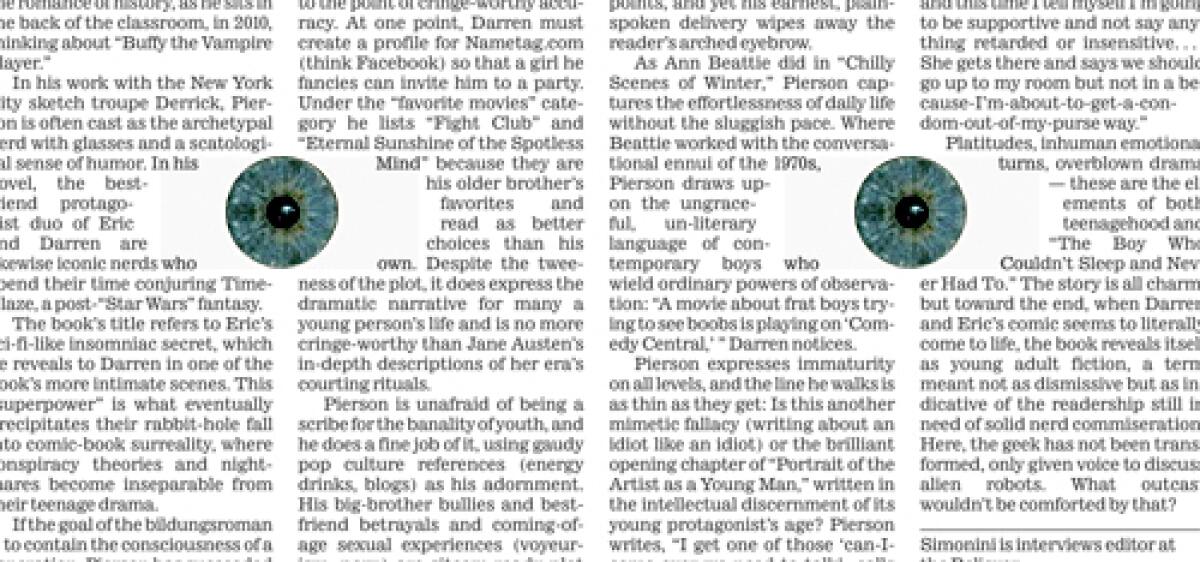‘The Boy Who Couldn’t Sleep and Never Had To’

- Share via
The Boy Who Couldn’t Sleep and Never Had To
A Novel
DC Pierson
Vintage Contemporaries: 240 pp.,
$14 paper
As writers such as Michael Chabon and Jonathan Lethem have embraced their comic-inspired youth, revealing an intimate love for the medium and an appreciation of its cultural resonance, they have in turn inspired the next generation of young comic-obsessed novelists. New crops of high-school pariahs continue to emerge, creating sci-fi worlds in notebook margins and not fearing to stand tall among the great modern-day creative force.
DC Pierson’s debut novel, “The Boy Who Couldn’t Sleep and Never Had To,” reveals the budding comic artist as he truly is, without the romance of history, as he sits in the back of the classroom, in 2010, thinking about “Buffy the Vampire Slayer.”
In his work with the New York City sketch troupe Derrick, Pierson is often cast as the archetypal nerd with glasses and a scatological sense of humor. In his novel, the best-friend protagonist duo of Eric and Darren are likewise iconic nerds who spend their time conjuring TimeBlaze, a post- “Star Wars” fantasy.
The book’s title refers to Eric’s sci-fi-like insomniac secret, which he reveals to Darren in one of the book’s more intimate scenes. This “superpower” is what eventually precipitates their rabbit-hole fall into comic-book surreality, where conspiracy theories and nightmares become inseparable from their teenage drama.
If the goal of the bildungsroman is to contain the consciousness of a generation, Pierson has succeeded to the point of cringe-worthy accuracy. At one point, Darren must create a profile for Nametag.com (think Facebook) so that a girl he fancies can invite him to a party. Under the “favorite movies” category he lists “Fight Club” and “Eternal Sunshine of the Spotless Mind” because they are his older brother’s favorites and read as better choices than his own. Despite the twee-ness of the plot, it does express the dramatic narrative for many a young person’s life and is no more cringe-worthy than Jane Austen’s in-depth descriptions of her era’s courting rituals.
Pierson is unafraid of being a scribe for the banality of youth, and he does a fine job of it, using gaudy pop culture references (energy drinks, blogs) as his adornment. His big-brother bullies and best-friend betrayals and coming-of-age sexual experiences (voyeurism, porn) are sitcom-ready plot points, and yet his earnest, plainspoken delivery wipes away the reader’s arched eyebrow.
As Ann Beattie did in “Chilly Scenes of Winter,” Pierson captures the effortlessness of daily life without the sluggish pace. Where Beattie worked with the conversational ennui of the 1970s, Pierson draws upon the ungraceful, un-literary language of contemporary boys who wield ordinary powers of observation: “A movie about frat boys trying to see boobs is playing on ‘ Comedy Central,’ ” Darren notices.
Pierson expresses immaturity on all levels, and the line he walks is as thin as they get: Is this another mimetic fallacy (writing about an idiot like an idiot) or the brilliant opening chapter of “Portrait of the Artist as a Young Man,” written in the intellectual discernment of its young protagonist’s age? Pierson writes, “I get one of those ‘can-I-come-over-we-need-to-talk’ calls and this time I tell myself I’m going to be supportive and not say anything retarded or insensitive. . . . She gets there and says we should go up to my room but not in a because-I’m-about-to-get-a-condom-out-of-my-purse way.”
Platitudes, inhuman emotional turns, overblown drama -- these are the elements of both teenagehood and “The Boy Who Couldn’t Sleep and Never Had To.” The story is all charm, but toward the end, when Darren and Eric’s comic seems to literally come to life, the book reveals itself as young adult fiction, a term meant not as dismissive but as indicative of the readership still in need of solid nerd commiseration. Here, the geek has not been transformed, only given voice to discuss alien robots. What outcast wouldn’t be comforted by that?
Simonini is interviews editor at the Believer.
More to Read
The biggest entertainment stories
Get our big stories about Hollywood, film, television, music, arts, culture and more right in your inbox as soon as they publish.
You may occasionally receive promotional content from the Los Angeles Times.








